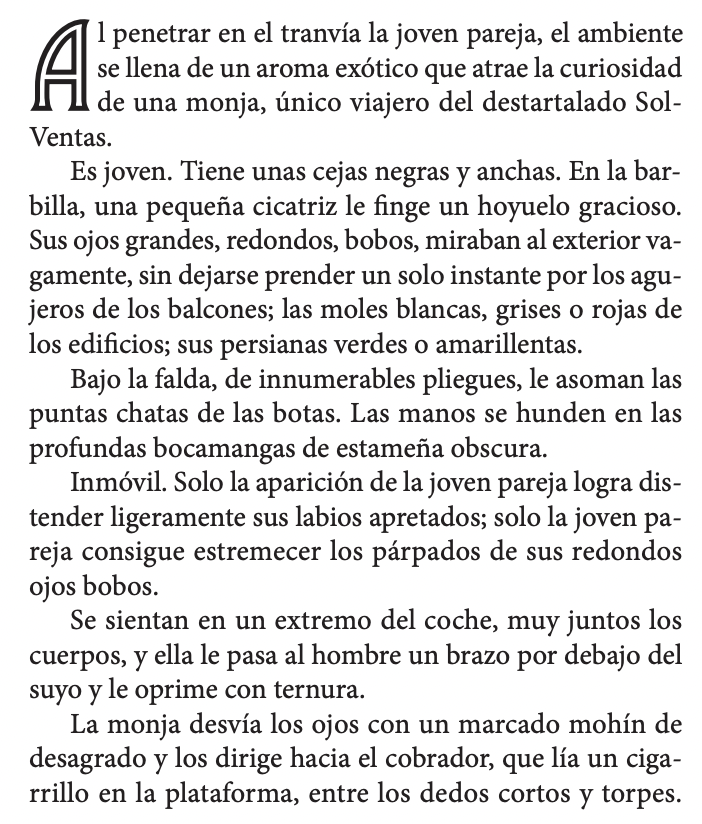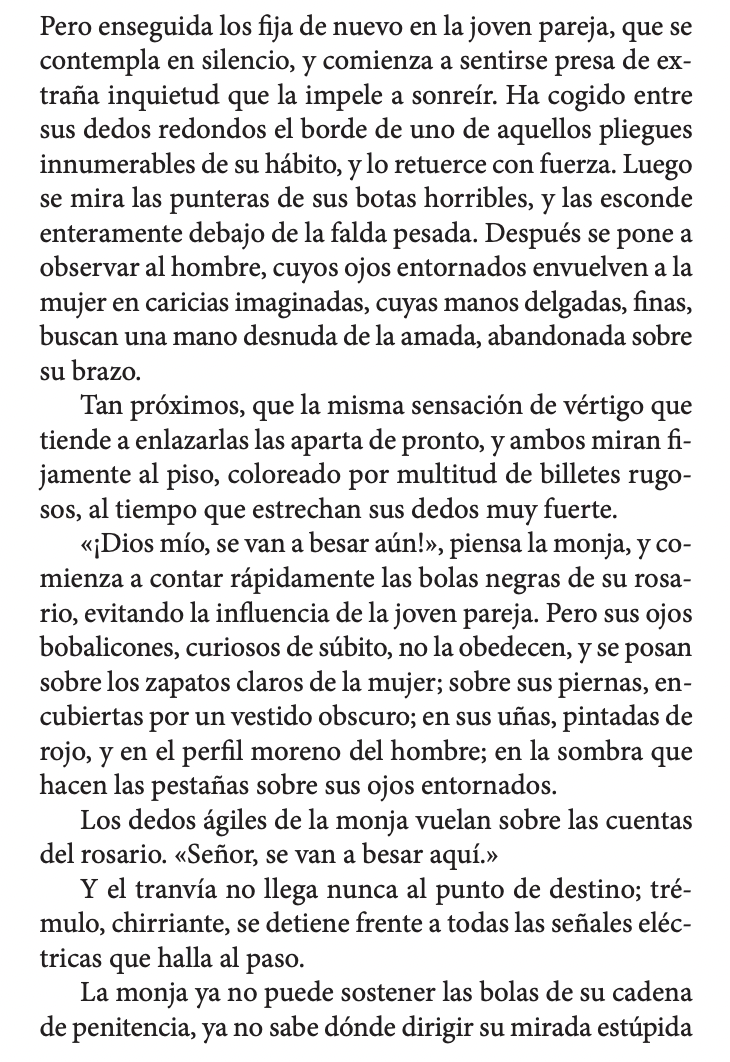
On the Tram by Luisa Carnés Translated by Robin Munby




As the young couple enter the rickety Sol-Ventas tram, the air fills with an exotic aroma, arousing the curiosity of a nun, the only other passenger on board.
She is young too. She has broad, black eyebrows, and a small scar at the end of her chin that could almost pass for a little dimple. She had been staring vacantly out of the window, her big, round, bovine eyes not daring to linger for a single second on the gaps between the balcony railings, on the blocks of white, grey or red buildings, on their green and yellow blinds.
The tips of her square-toed shoes peak out from beneath her skirt’s endless pleats. Her hands are buried deep in dark serge cuffs.
Motionless. Only with the young couple’s arrival do her tightly fastened lips loosen ever so slightly; do the lids of her round, bovine eyes start to tremble.
The couple sit at the back of the tram, their bodies close, and she stretches out her arm under his, holding him tenderly.
The nun averts her eyes with a look of marked disapproval, turning instead to the conductor, who is on the platform rolling a cigarette between his short, clumsy fingers. But soon her eyes are fixed on the young couple once more, sat in silent contemplation, and she feels herself caught up by a strange disquiet, which draws a smile from her lips. She takes the edge of one of her habit’s innumerable pleats and twiddles it furiously between her round fingers. She looks down at the toes of her horrid shoes and hides them from view beneath her heavy dress. Then she turns her gaze on the man, whose narrowed eyes are enveloping the woman in imagined caresses, his slim, delicate hands searching out the bare hand of his beloved, which lies limp upon his arm.
They are so close that the same vertiginous feeling drawing them together now pushes them abruptly apart, and they stare down at the floor, festooned with crumpled tickets, their fingers tightly enlaced.
“Dios mío! They’re actually going to kiss!” thinks the nun, and she begins hastily counting the black beads of her rosary, fighting the influence of the young couple. But her bovine eyes, suddenly filled with curiosity, won’t obey, and they alight on the woman’s white shoes; on her legs, covered by her dark dress; on her nails, painted red, and on the man’s dark profile; on the shadows his eyelashes cast across his narrowed eyes.
The rosary beads are flying through the nun’s nimble fingers. “Oh Lord, they’re going to kiss right here.”
And the tram seems bound never to reach its destination; it comes to a shuddering, screeching stop at each signal light along the route.
The nun is no longer capable of holding onto the beads of her penance chain, she doesn’t know where to direct her stupid, prying gaze – it settles on a notice in black lettering: “No smoking”; on a blue sign: “Bargain hats”; a red one: “Supreme laxative”, before finally, inevitably, returning to the young couple.
“Oh, they’re going to kiss right here!”
Her brow is ablaze.
“They’re going to kiss!”
But no. The man gives a quick nod to the conductor and off they get.
The nun turns her head and watches them disappear among the passers-by; she lets out a sigh, all a-fluster, quivering; she takes a breviary from her handbag and her lips start moving frantically, her bovine eyes fixed on its upside-down pages.
Born to a working-class family in Madrid in 1905, Luisa Carnés was a self-taught writer and journalist who rose to prominence during the Spanish Second Republic. ‘On the Tram’ was first published in the Madrid newspaper La Voz in 1931, while her best-known novel Tea Rooms. Mujeres obreras, was published in 1934. In 1939, Carnés, a committed communist, would be forced into exile as a result of the Spanish Civil War, eventually arriving in Mexico, where she spent the rest of her life. Carnés’s work, along with that of many other exiled women writers of her generation, was largely forgotten in Spain until very recently. Fortunately, her writing has at last begun to be rediscovered, and she is finally being recognized as the great writer she is.
Robin Munby is a freelance translator from Liverpool and based in Madrid, working from Spanish and Russian into English. His translations have appeared in Asymptote, Apofenie, Wasafiri Magazine, the Glasgow Review of Books and the Cambridge Literary Review. He is currently learning Asturian.
4 January 2022

Leave a Reply